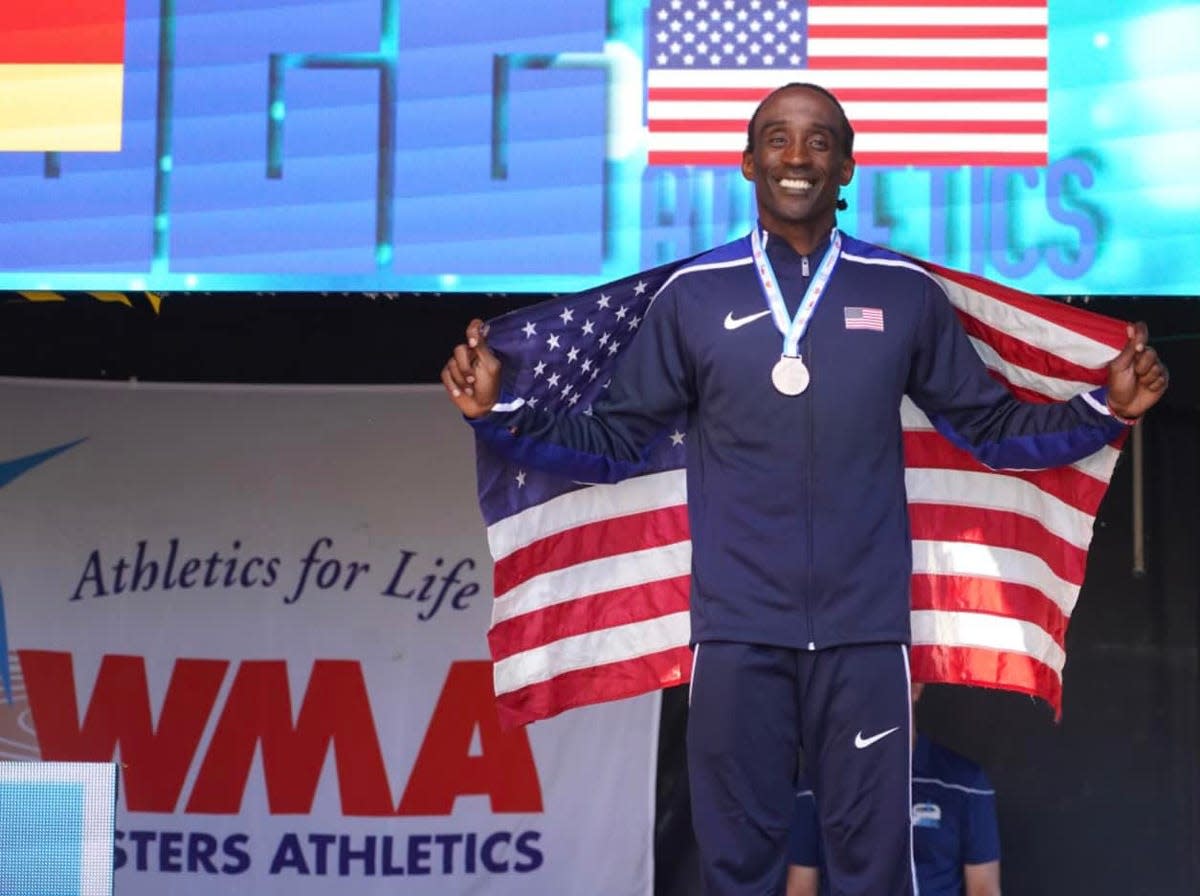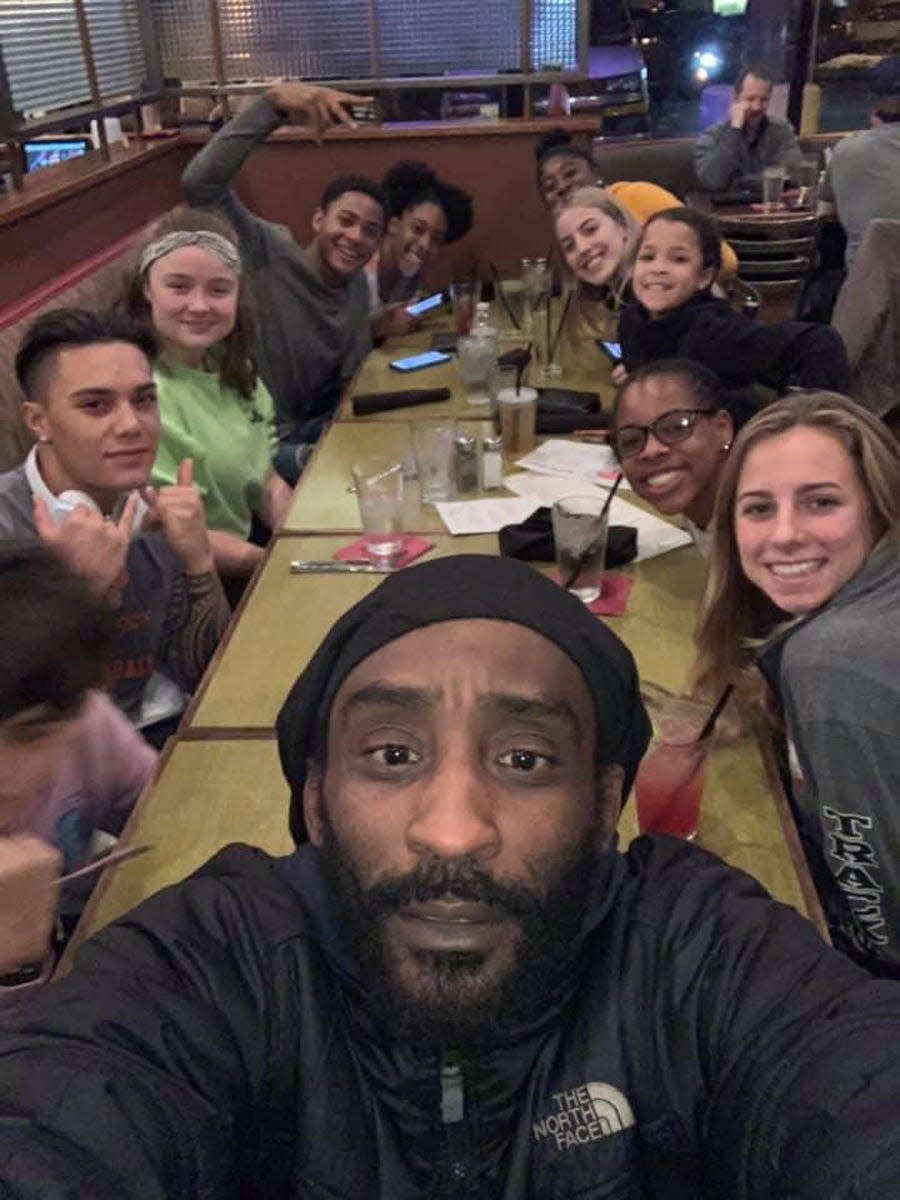Ron Atkins is still running, with success now on the world stage

Running Ron Atkins is now officially one of the fastest in the world in his age bracket. The 1992 Bremerton High School graduate and state 200-meter champion proved it over a 12-day competition that started in late June, at the World Masters Athletics in Tampere, Finland.
Atkins, 48, finished third in the 200, fifth in the 100 and won a gold medal helping the U.S. 4x400 team share that championship with Australia.
Bremerton once had Rocket Ron (Vehrs), a champion sprinter in the 1950s, and now has Running Ron, a guy who refuses to quit, who runs (and trains) as if his life (and health) depends on it.
His ability to run fast times is as amazing as it was in high school, when he anchored the Knights' 4x100 relay team to third place in state and captured the 200 title with a time of 22.25, which was just off his personal best of 21.9.
Since 2014 Atkins has won 10 national masters titles, and there are nearly 40 all-American labels next to his name for his continued success on the track. His 11th, at the world championships in Finland, where all athletes were 35 years old or older, came after he unexpectedly was tabbed to run the second leg of the 4x400.
Atkins had to run two preliminary races in the 100 and 200 before reaching the finals. That can be exhausting, even for the fittest athlete. But he did it in style, finishing second in a first-round heat of the 100 to another American, Rawle DeLisle, who finished in 11.58 seconds to Atkins’ 11.88. In the semifinals he ran an 11.55, landing the 8th spot in the finals race.
In the 100 finals, Atkins got off to his customary slow start and then showed his ability to kick it in another gear, finishing fifth with a time of 11.45.
Two days later, Atkins was even better while running the 200, winning his opening heat with a time of 23.83 to qualify fourth to the semifinals. He ran a 23.39 to make the finals, scheduled two hours later, and then gutted it out to beat DeLisle for a medal, clocking 23.29 for third place and bronze medal.
Asked how he could come back after losing to DeLisle in previous prelims in both the 100 and 200 and then beat him, Atkins said, “I was not running in my top speed (in the prelims). I ran 800 meters (that day) and I was conserving my energy.”
On July 7, the United States 4x100 relay was planning on making a big splash with Atkins as anchor. It turned into a belly flop. The quartet dropped the baton between the first and second leg and did not finish.
“We were going to win it,” says Atkins. “We were in first place. After we dropped the baton, I wasn’t real happy.”
Atkins figured that cost him the chance to recoup the price of his airline ticket, since participants for the United States get a small stipend with each medal won.
Deflated, but not beaten, the eternal optimistic Atkins listened when he was asked to run the 4x400 relay. He always tells young athletes he trains at his place — Full Circle Athletes in Tacoma — the team is most important, so you do everything you can to help it.
“I have asked kids for years to come together to form teams to get the stick around,” Atkins says. “Some have complained, some have ducked, but most have put our team first and left with a medal. I was asked to do the same and without hesitation, regardless of feeling, said yes for my teammates and for my country.”
Atkins knows you have to believe that you can do anything you set your mind to. He teaches that way, and the chance to back up his own words was right there. So he ran.
Joshua Huff ran the first leg, Atkins took over as the second, Mark Williams ran third and DeLisle anchored. Atkins passed along a video of the race, and if you know anything about this type of race they usually don’t come down to the wire. But this one did.
The Australians took a big lead on the first lap and then Atkins did as he always does, performing to his max. You have to give him a lot of credit. He was still bothered by the dropped baton in the 4x100 when he got the handoff from Huff trailing by about 40 meters.
I reminded Atkins of Silky Sullivan, even though Atkins was not born when Silky Sullivan became a legend. Silky, a gray thoroughbred who became famous in the 1960s and 70s for his incredible come-from-behind victories, once by 41 lengths. His name is now used (although not as much as it once was) for a team or someone who comes back after being so far behind there is thought to be no way to win.
Watching the video of this race, Atkins took off and kept closing the gap with the Australian. Atkins’s split for the 400 was 52.8, and he was about to run up the Australian’s back when they reached the exchange zone.
The U.S. team lost ground on the third leg, but DeLisle took off like Atkins and actually had a small lead with 200 meters left. The Australian anchor moved ahead down the stretch, but DeLisle, who ran a 50.8 split, somehow managed to lunge at the finish line and pull into a tie. So gold medals were handed all around to everyone for a remarkable race.

Atkins has been training athletes, young and old, for two decades, and has been coaching for the last nine years with the Kitsap Fliers track and field club, an organization he co-founded. He was involved with Bremerton High School football for a little while, but now is training runners and other athletes for health and wellness and for competition.
His main focus was Bremerton youth, because he felt he was not given the help he needed when he was young and wanted to make sure others don’t ever feel like he once did.
“I didn’t have a whole lot of guidance coming out of Bremerton High School to make it out of Bremerton and be a successful human being,” he says. So he works to make sure others have the guidance, and the help that he didn’t.
It’s expensive to do what he does and compete in big national masters events. Go FundMe campaigns and individual sponsorships have helped him navigate the money it takes. His lodging in Finland was supported by a sponsorship from The Foundation for Homeless and Poverty Management, a Kitsap-based nonprofit run by Drayton Jackson, who's also a Central Kitsap School District board member.
As Atkins looks forward to the future he still has plenty of time left as a runner. When he goes to national events there are people 70 and 80 years old competing, and competing well.
“I’m going to compete as long as I can,” he says, noting he’s in the gym every day. “It’s what I do. I have the ability. I’m currently ranked No. 9 in the world in the 100. Running is my hobby. I take advice from (singer, songwriter, actress) Mya. She said, ‘Take what you do best and develop it professionally.’”
Terry Mosher is a longtime Kitsap County sportswriter who writes features on local sports personalities for the Kitsap Sun. Contact him at bigmosher@msn.com.
This article originally appeared on Kitsap Sun: Ron Atkins still running, gold relay medal at World Masters Athletics

